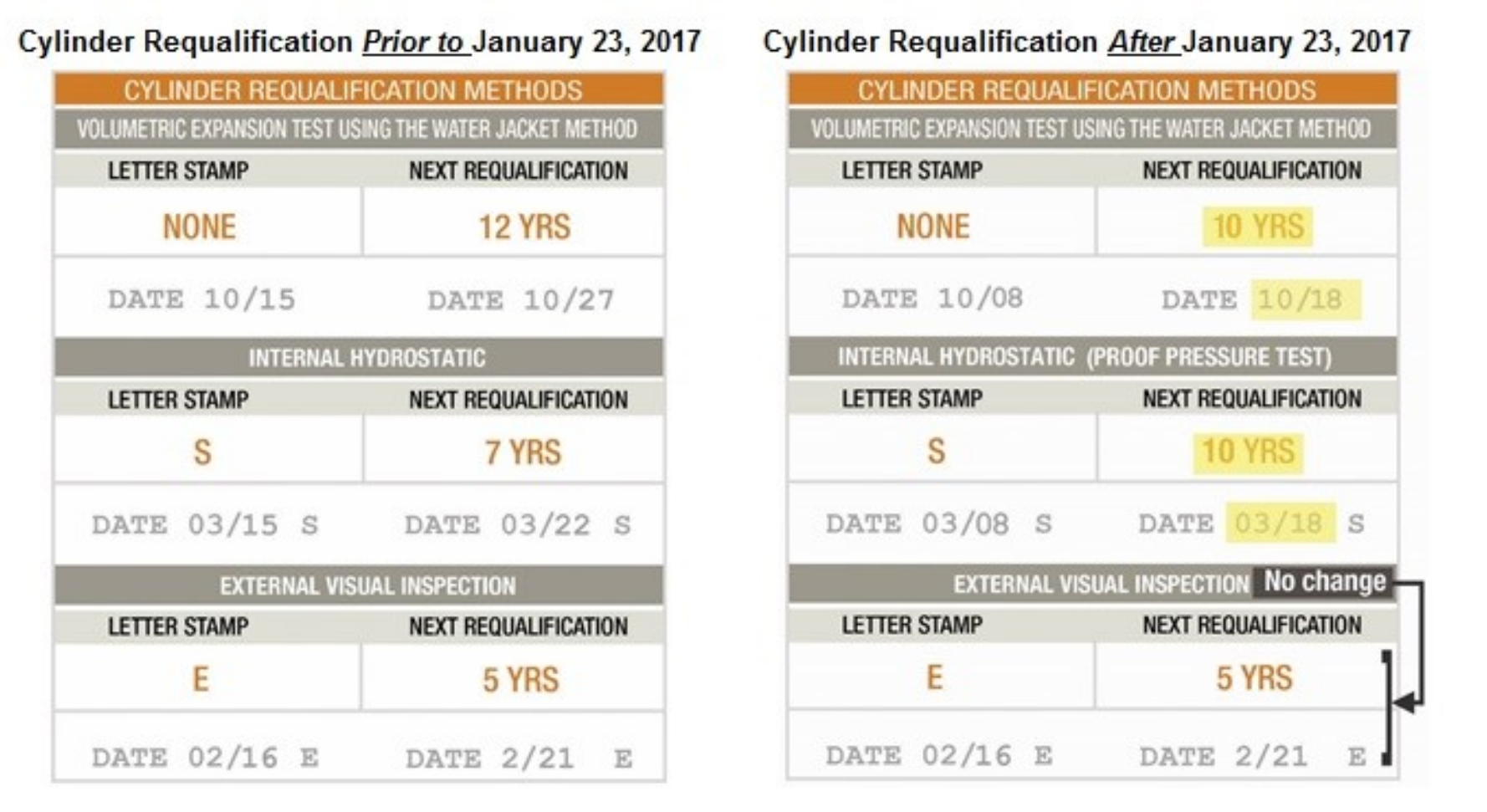Thursday, January 26, 2017
The Department of Transportation (DOT) has finalized a new rule affecting timeframes pertaining to the requalification of DOT cylinders; the new rule took effect January 23, 2017.
The rule affects the following areas of cylinder requalification:
• Reduces the initial requalification period for DOT cylinders from 12 years to 10 years from the date of manufacture.
• Reduces the requalification period for cylinders that are requalified using volumetric expansion testing from 12 years to 10 years.
• Increases the requalification period for cylinders that are requalified using a proof pressure test from 7 years to 10 years.
• Does not affect the 5-year visual inspection method for cylinder requalification.
The new requalification periods apply to all DOT specification cylinders (4B, 4BA, 4BW, 4E) in the marketplace. So, for example, prior to the rule-making, a 20-lb grill cylinder that was manufactured in December 2006 would be subject to an initial requalification in December 2018 (12 years later). On and after Jan. 23, 2017 that changes, and the same cylinder is due for requalification December 2016. If the cylinder is filled and in service, it requires the requalification once the cylinder is emptied.
The new rule will affect anyone who requalifies, fills, transports, or prepares shipments of DOT cylinders (such as a cylinder delivery driver). This includes the thousands of dispenser operators across the country.
The new rule also affects many Propane Education & Research Council (PERC) safety & training materials, including several CETP courses, Dispensing Propane Safely, and the new training course for plumbers and HVAC technicians.
Some of the PERC Safety & Training materials do not yet reflect the changes in cylinder requalification brought about by the new rule. As such, PERC encourages propane-related businesses to modify their training, as applicable, to the requirements of the new rule and to advise those who conduct or are involved with training employees and reseller customers about these changes. The graphics below may be helpful. PERC is currently coordinating with its fulfillment center to inform those who purchase PERC Safety & Training programs after the new rule takes effect. This action may cause a slight delay in purchasing of those materials.
PERC is currently coordinating with its fulfillment center to inform those who purchase PERC Safety & Training programs after the new rule takes effect. This action may cause a slight delay in purchasing of those materials.
PERC is currently working on other communications strategies on the issue and is coordinating closely with NPGA and will keep propane industry members updated with new information as it arises.
For any questions regarding the new rule, please contact the following PERC or the National Propane Gas Association (NPGA) contacts below:
Regulatory: Mike Caldarera at This email address is being protected from spambots. You need JavaScript enabled to view it. or Sarah Reboli at This email address is being protected from spambots. You need JavaScript enabled to view it.
CETP Testing: Eric Kuster at This email address is being protected from spambots. You need JavaScript enabled to view it.
CETP Training and PERC materials: Stuart Flatow at This email address is being protected from spambots. You need JavaScript enabled to view it. or
Courtney Gendron at This email address is being protected from spambots. You need JavaScript enabled to view it.
The rule affects the following areas of cylinder requalification:
• Reduces the initial requalification period for DOT cylinders from 12 years to 10 years from the date of manufacture.
• Reduces the requalification period for cylinders that are requalified using volumetric expansion testing from 12 years to 10 years.
• Increases the requalification period for cylinders that are requalified using a proof pressure test from 7 years to 10 years.
• Does not affect the 5-year visual inspection method for cylinder requalification.
The new requalification periods apply to all DOT specification cylinders (4B, 4BA, 4BW, 4E) in the marketplace. So, for example, prior to the rule-making, a 20-lb grill cylinder that was manufactured in December 2006 would be subject to an initial requalification in December 2018 (12 years later). On and after Jan. 23, 2017 that changes, and the same cylinder is due for requalification December 2016. If the cylinder is filled and in service, it requires the requalification once the cylinder is emptied.
The new rule will affect anyone who requalifies, fills, transports, or prepares shipments of DOT cylinders (such as a cylinder delivery driver). This includes the thousands of dispenser operators across the country.
The new rule also affects many Propane Education & Research Council (PERC) safety & training materials, including several CETP courses, Dispensing Propane Safely, and the new training course for plumbers and HVAC technicians.
Some of the PERC Safety & Training materials do not yet reflect the changes in cylinder requalification brought about by the new rule. As such, PERC encourages propane-related businesses to modify their training, as applicable, to the requirements of the new rule and to advise those who conduct or are involved with training employees and reseller customers about these changes. The graphics below may be helpful.

PERC is currently working on other communications strategies on the issue and is coordinating closely with NPGA and will keep propane industry members updated with new information as it arises.
For any questions regarding the new rule, please contact the following PERC or the National Propane Gas Association (NPGA) contacts below:
Regulatory: Mike Caldarera at This email address is being protected from spambots. You need JavaScript enabled to view it. or Sarah Reboli at This email address is being protected from spambots. You need JavaScript enabled to view it.
CETP Testing: Eric Kuster at This email address is being protected from spambots. You need JavaScript enabled to view it.
CETP Training and PERC materials: Stuart Flatow at This email address is being protected from spambots. You need JavaScript enabled to view it. or
Courtney Gendron at This email address is being protected from spambots. You need JavaScript enabled to view it.

